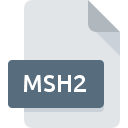
MSH2 File Extension
Microsoft Shell Script Format
-
Category
-
Popularity0 ( votes)
What is MSH2 file?
MSH2 is a file extension commonly associated with Microsoft Shell Script Format files. MSH2 files are supported by software applications available for devices running . Files with MSH2 extension are categorized as Misc Files files. The Misc Files subset comprises 6033 various file formats. Users are advised to use Windows PowerShell software for managing MSH2 files, although 1 other programs can also handle this type of file. Software named Windows PowerShell was created by Microsoft Corporation. In order to find more detailed information on the software and MSH2 files, check the developer’s official website.
Programs which support MSH2 file extension
MSH2 files can be encountered on all system platforms, including mobile, yet there is no guarantee each will properly support such files.
Updated: 07/26/2020
How to open file with MSH2 extension?
There can be multiple causes why you have problems with opening MSH2 files on given system. On the bright side, the most encountered issues pertaining to Microsoft Shell Script Format files aren’t complex. In most cases they can be addressed swiftly and effectively without assistance from a specialist. The list below will guide you through the process of addressing the encountered problem.
Step 1. Install Windows PowerShell software
 The main and most frequent cause precluding users form opening MSH2 files is that no program that can handle MSH2 files is installed on user’s system. The most obvious solution is to download and install Windows PowerShell or one to the listed programs: Microsoft Windows Shell. On the top of the page a list that contains all programs grouped based on operating systems supported can be found. One of the most risk-free method of downloading software is using links provided by official distributors. Visit Windows PowerShell website and download the installer.
The main and most frequent cause precluding users form opening MSH2 files is that no program that can handle MSH2 files is installed on user’s system. The most obvious solution is to download and install Windows PowerShell or one to the listed programs: Microsoft Windows Shell. On the top of the page a list that contains all programs grouped based on operating systems supported can be found. One of the most risk-free method of downloading software is using links provided by official distributors. Visit Windows PowerShell website and download the installer.
Step 2. Update Windows PowerShell to the latest version
 If you already have Windows PowerShell installed on your systems and MSH2 files are still not opened properly, check if you have the latest version of the software. Sometimes software developers introduce new formats in place of that already supports along with newer versions of their applications. This can be one of the causes why MSH2 files are not compatible with Windows PowerShell. The latest version of Windows PowerShell should support all file formats that where compatible with older versions of the software.
If you already have Windows PowerShell installed on your systems and MSH2 files are still not opened properly, check if you have the latest version of the software. Sometimes software developers introduce new formats in place of that already supports along with newer versions of their applications. This can be one of the causes why MSH2 files are not compatible with Windows PowerShell. The latest version of Windows PowerShell should support all file formats that where compatible with older versions of the software.
Step 3. Associate Microsoft Shell Script Format files with Windows PowerShell
After installing Windows PowerShell (the most recent version) make sure that it is set as the default application to open MSH2 files. The next step should pose no problems. The procedure is straightforward and largely system-independent

Selecting the first-choice application in Windows
- Right-click the MSH2 file and choose option
- Click and then select option
- Finally select , point to the folder where Windows PowerShell is installed, check the Always use this app to open MSH2 files box and conform your selection by clicking button

Selecting the first-choice application in Mac OS
- From the drop-down menu, accessed by clicking the file with MSH2 extension, select
- Open the section by clicking its name
- Select Windows PowerShell and click
- If you followed the previous steps a message should appear: This change will be applied to all files with MSH2 extension. Next, click the button to finalize the process.
Step 4. Check the MSH2 for errors
If you followed the instructions form the previous steps yet the issue is still not solved, you should verify the MSH2 file in question. It is probable that the file is corrupted and thus cannot be accessed.

1. Verify that the MSH2 in question is not infected with a computer virus
If the MSH2 is indeed infected, it is possible that the malware is blocking it from opening. Scan the MSH2 file as well as your computer for malware or viruses. If the MSH2 file is indeed infected follow the instructions below.
2. Check whether the file is corrupted or damaged
If you obtained the problematic MSH2 file from a third party, ask them to supply you with another copy. It is possible that the file has not been properly copied to a data storage and is incomplete and therefore cannot be opened. If the MSH2 file has been downloaded from the internet only partially, try to redownload it.
3. Ensure that you have appropriate access rights
Some files require elevated access rights to open them. Log out of your current account and log in to an account with sufficient access privileges. Then open the Microsoft Shell Script Format file.
4. Check whether your system can handle Windows PowerShell
The operating systems may note enough free resources to run the application that support MSH2 files. Close all running programs and try opening the MSH2 file.
5. Ensure that you have the latest drivers and system updates and patches installed
Regularly updated system, drivers, and programs keep your computer secure. This may also prevent problems with Microsoft Shell Script Format files. Outdated drivers or software may have caused the inability to use a peripheral device needed to handle MSH2 files.
Do you want to help?
If you have additional information about the MSH2 file, we will be grateful if you share it with our users. To do this, use the form here and send us your information on MSH2 file.

 Windows
Windows 

